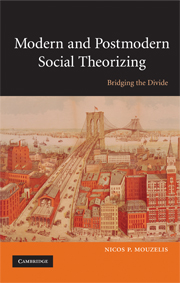Book contents
- Frontmatter
- Contents
- List of figures
- Acknowledgements
- Introduction
- Part I The theoretical background: the development of the agency–structure problematic
- Part II Parsonian and post-Parsonian developments
- Part III Agency and structure: reworking some basic conceptual tools
- Part IV Bridges between modern and late/postmodern theorizing
- Part V Towards a non-essentialist holism
- Instead of Conclusion: Twelve rules for the construction of an open-ended holistic paradigm
- Appendix: In defence of ‘grand’ historical sociology
- References
- Index
Introduction
Published online by Cambridge University Press: 05 June 2012
- Frontmatter
- Contents
- List of figures
- Acknowledgements
- Introduction
- Part I The theoretical background: the development of the agency–structure problematic
- Part II Parsonian and post-Parsonian developments
- Part III Agency and structure: reworking some basic conceptual tools
- Part IV Bridges between modern and late/postmodern theorizing
- Part V Towards a non-essentialist holism
- Instead of Conclusion: Twelve rules for the construction of an open-ended holistic paradigm
- Appendix: In defence of ‘grand’ historical sociology
- References
- Index
Summary
There have been fundamental changes in the past three decades, both on the level of social theory, and on the level of the social realities that this theory tries to describe and explain. Concerning the former we have witnessed a post-positivist/anti-foundationalist as well as a linguistic/cultural turn. With regard to the latter, the abrupt opening of world markets (particularly financial ones) in combination with the new information technologies has led to a type of neoliberal globalization within which nation-states have had to change profoundly both their internal structures and their external strategies in their attempts to thrive or even just survive in a new, highly competitive world order.
For some social theorists the above changes have been so radical that the term ‘modern’ should be replaced by the term ‘postmodern’ – both on the level of second-order theoretical discourses, and on the more practical one of first-order laypersons' discursive and non-discursive practices. Hence the talk about postmodern theory and postmodern society: a social order within which the belief systems and the collective certainties of early modernity have evaporated – this state of affairs leading to constant references to the ‘death of the subject’, the ‘end of history’, the ‘dissolution of metaphysics’, the ‘implosion of the social’, the ‘eclipse of the political’, etc.
Against this hyperbolic tendency to exaggerate partial trends to the point of showing them as totally dominant, other theorists (including myself) consider that the term late-modern rather than postmodern is a more appropriate characterization of present-day society and theory.
- Type
- Chapter
- Information
- Modern and Postmodern Social TheorizingBridging the Divide, pp. 1 - 6Publisher: Cambridge University PressPrint publication year: 2008

